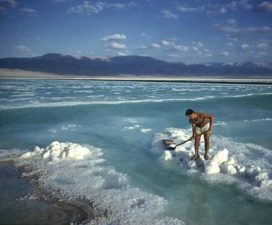 A Green Prophet reader shares her personal story on starting up a green business in the Middle East – Diamond Solar Services. Image via pinksherbert
A Green Prophet reader shares her personal story on starting up a green business in the Middle East – Diamond Solar Services. Image via pinksherbert
My name is Chava and I’m a green nerd. I love saying that. It sounds kind of corny and probably not the impression you would get if you met me, but it’s true.
Some people like comic books, some fashion, I love the green world and all the people attached to it. I’m fascinated by new and brilliant technology, things that move the world on the high speed train of life or in some cases …the wings of a hovercraft. It fits with my passion of loving to be involved with making the world a better place.
My story is this: I am a Canadian-Israeli business developer and I took a hiatus from work here in Israel and moved back to my hometown in Canada for about a year and a half, where I continued education in my former field of insurance, specifically industrial commercial business, and worked till returning to Israel.
In Canada, I was focused on a future of environmental liability and what I could contribute to getting companies to go green by better insurance incentives. Canada is a beautiful country with beautiful people: I loved the baseball, beer, geese, deer and raccoons that came up to my doorstep, but I missed Israel and felt it was time to come home.
 I was impressed by how seriously the municipalities in Canada recycle and take environmental action seriously. I was impressed by seeing how the average person really does think about it and of the future for his children and the world.
I was impressed by how seriously the municipalities in Canada recycle and take environmental action seriously. I was impressed by seeing how the average person really does think about it and of the future for his children and the world.
I returned to Israel, went job hunting and after a few months of not finding anything, a friend of mine convinced me to open my own business. But this article is not about that, I only mention it briefly to tell a story and demonstrate of how a person can ignore the chicken littles of today’s economy and say ‘wait a minute, where is the opportunity’ and find it.
I took a few days off from sending out resumes and just tried to come up with ideas of a business for my neighbourhood with the idea of how can I serve? what good or service do people need that I can offer that requires no overhead or investment, but just plain old hard work?
I came up with 9 ideas and ran with first one.
Diamond Solar Systems was born.
Now, I am offering people the opportunity to make money from their roof, private homes to start, some other buildings as well, and I am able to offer a 6 year return on investment (ROI) and a return of 17 percent a month, tax free.
My banker was thrilled to offer financing to people who want the system, but want to start with a low down payment and gave me an incredible interest rate and terms. I started off just by preparing my offering with the kind help of a business mentor and I was off and running knocking on doors with appointments lined up the first day.
Anyone today can ignore the economic doomsayers and say ‘where is the opportunity?’
In the green world, there is incredible opportunity for new businesses, goods and services that will have to be created to address the need required for our changing environment.
When I was in Canada, I had the great fortune to be at an environmental NGO dinner with a former Yale professor of entrepreneurial businesses, someone who has spearheaded Cap and Trade. His words made an indelible impression on me. I asked him back in the winter of 2009, at the height of economic panic, ‘where do you think the economy is going, is it all bust’ and his answer to me astounded.
He said, it is exactly the opposite: there has never been more opportunity than there is now.
What can we the public do to make good on these opportunities?
Public Procurement is a policy of very tax dollar being spent only on products and services that have an environmental benefit. New building, like schools, roads, bridges, piers, trade, etc. – must be built with supplies and services from ‘green’ companies and in such a way to ‘green’ standards.
If countries, states, cities take on the obligation of public procurement, can you imagine how many new businesses will be needed to fill the void. There are many, but not nearly enough.
Can you imagine having more contracts and orders to fill that you can supply and how many people you will have to train and employ to meet demand…how many jobs you are creating in the process.
Well keep the dream because the potential and momentum has never been greater than this time. Why? Because of the obvious environmental need, there is no choice – scientists know it, people know it, governments know it.
Governments talk about it, waste far too much time on new legislation and policies that are convoluted by nature of their having various interests to cow-tie to. This is a marketing strategy that addresses main global problems with solutions. It is not based on new ideas or my ideas, but simply an overall view from the ideas of some very brilliant people I’ve read about.
One is Mark Halle. What a genius. Halle lectures, writes and publishes frequently on issues relating to sustainable development and to multilateral trade policy. He is founder and former Chairman of the Board of the International Centre for Trade and Sustainable Development. He recently gave a lecture on Public Procurement. It is defined as being when a government makes a decision that all their spending, must be environmentally tied.
Tie that together with what the major developed countries of the OECD (Organization of Economic Cooperation and Development) are saying.
This broadcasts where the markets are heading and the tremendous opportunity right now. While the markets are scary from 2008, chill out, there is more openness toward new business ideas now than there has been in years:
According to the OECD: “Governments are facing one of the hardest balancing acts in the history of policy-making: they have to reduce unprecedented levels of unemployment and unsustainable fiscal deficits and public debt. All this within a framework of low economic growth and a lost output potential of nearly 4%.
Let me highlight three of the most important challenges in this respect:
First, pro-growth structural reform will be needed to spur labour.
Second, it is indeed a great challenge to try to improve the employment outlook especially for our youth …
Third, to face these challenges successfully governments and markets will have to explore new sources of growth as new engines of growth for supporting the recovery after the crisis in a smart way. At the OECD they have focused on two elements: Innovation and Green Growth
Wow, so what’s the problem, why aren’t we reading about this renaissance in the newspaper and all over the net? Mark Halle, along with others, say its up to the government to get the ball rolling with a policy of Public Procurement and its up to companies to show the policy makers how its to their absolute benefit and how it can and it should happen overnight.
Take a look at the Copenhagen Conference. After much fanfare and excitement, it still did not even come close to generating the positive changes to address the ‘in our face’ catastrophes that are inevitable if substantial change isn’t faced head on.
The much ballyhooed Copenhagen conference was lost to a large degree, fell short of what is needed and there was also much infighting and self-centredness by some countries, as well as a lack of broad consensus on goals.
One can say how irresponsible, how short-sighted and self-serving our public representatives can be. But people have to have an honest awareness of what the problem is and in order not to engender a selfish or corrupt response, people have to know there is a solution.
This was where Copenhagen failed and Public Procurement can succeed. It is the solution, not limited to just the immediate problem at hand and the obvious corrections, but also setting in motion a domino effecting a wider perspective of the long-term, while addressing underlying weaknesses – which in environmental, as in all in issues, may be social, political, etc.
According to Halle, there is a 35 year window to bring drastic environmental consumption up to speed, without irreversible damage. What is that damage? Well, imagine the weather catastrophes we have seen much worse. A child who is born today will only be 35 and starting a family when that damage starts to afflict the earth, unless these changes are not decided on, but made. There is nothing to discuss, it has to be done.
Public Procurement is the immediate way to go
It is a decision that can be made overnight and with only benefit. It only takes a clear decision and dedicated organizing of ideas and structure. If governments made this commitment of how they spent our tax dollars, it would create an economic pressure on all companies and corporations to go green.
And as cap and trade grows, it becomes a great opportunity. People as individuals are hard to change. People don’t adapt easily to change. While there is a large movement toward all that is green, it does not seem it will happen overnight by relying on the public first. People have other pressures, feeding and sustaining their families, living a base or better sort of living, people care, but for many, it’s farther down the priority list. This is the reality. It is going to take the governments and then the business communities to bring into being the green world necessary.
This is an exciting opportunity for green companies, entrepreneurs, investors and green nerds out there like me… We have an open playing field to fill many needs, including attractive investment companies for cap and trade tools.
All products and services possible – whether building materials, or other materials –only purchased with tax dollars if they are green. The small business owner, big CEO, shareholders and the public at large can only benefit.
To conclude; interglobal marketing and manufacture is a great way to get countries on board, to promote the kind of international cooperation that Copenhagen attempted to achieve. It will offer hope, incentive, catalyze and produce.
Sharing the economic benefits by way of growing and cultivating resources in low-income countries, such as Africa and Asia, with scarce water resources, is a source of greatly needed income. Like biodiesel made from Jatropha – which grows easily, with almost no water in an arid environment being ideally suited for growth in these countries where nothing else can grow – certain products can be produced in one place and manufactured in another. The effect will be to uplift economies and interglobal cooperation. There are many new goods and services that fit.
Aligning business strategies with the goals of international, environmental policy groups to determine where there are gaps to fill and develop their products and services accordingly, create business that is both globally cooperative and forward-thinking is the way to go to meeting the 35 year window. The engine that will create the necessary, initial changes needed to bring this into being is Public Procurement.
– Chava Shaked (email: [email protected])



Comments are closed.